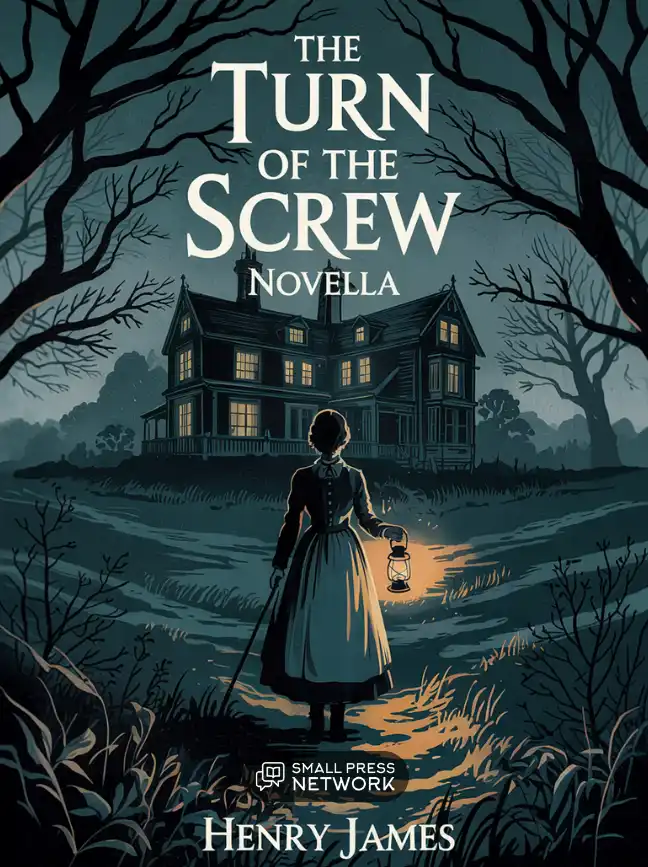A place further away from the platform.
THE GHOST AND HAMLET enter .
HAMLET.—Whither wilt thou lead me? Speak, I will go no further.
THE GHOST.—Listen to me.
HAMLET.—I will.
THE GHOST.—The hour is almost come when I must return to the sulphurous and torturing flames.
HAMLET.—Alas! poor soul!
THE GHOST.—Do not pity me; but pay serious attention to what I am about to reveal to you.
HAMLET.—Speak, I am bound to hear.
THE GHOST.—And to avenge it too, when you have heard.
HAMLET.—What then?
THE GHOST.—I am the spirit of thy father, condemned for a time to wander by night, and by day to fast, confined in flames, until the filth of the crimes committed during the days of my life be consumed and purified. Were I not forbidden to tell the secrets of my prison, I could unfold a tale, the slightest word of which would overwhelm thy soul, chill thy young blood, push thy two eyes like stars from their sockets, scatter the black and arranged curls of thy head, and make each of thy hairs stand apart on its root, like quills on the timid porcupine. But these revelations of eternity are not made for ears of flesh and blood. Hark,—hark,—oh! hark!—if thou hast ever loved thy tender father—
HAMLET.—O heavens!
THE GHOST.—Avenge him for a horrible and unnatural murder.
HAMLET.—Of murder?
THE GHOST.—Of a dreadful murder; and in the best case such is a murder; but this was the most dreadful, the most unheard of, the most unnatural.
HAMLET.—Haste to instruct me, that I, on wings as swift as reflection or love’s thoughts, may fly to my vengeance.
THE GHOST.—I find thee ready; and though thou werest more inert than the fat grass that rots at leisure on the banks of Lethe, wouldst thou not be excited by this? Now, Hamlet, hear: it hath been intimated that a serpent stung me while I slept in my orchard; thus hath the public ear of Denmark been grossly deceived by a forged report of my death. But know, thou, noble youth, that the serpent whose sting smote thy father’s life now wears his crown.
HAMLET.—O my prophetic soul! My uncle!
THE PHANTOM.—Yes, this incestuous, adulterous brute, by the magic of his mind, by treacherous gifts (O damnable mind, damnable gifts, that have power to seduce thus!) Won to his shameful lust the will of my queen, so virtuous in appearance. O Hamlet! what decadence was there! From me, whose love was of such dignity that it always walked with clasped hands, with the oath I had sworn to him at marriage, to descend to a wretch whose natural gifts were so poor compared to mine! But, as virtue will never be shaken, though lust woo her in a divine form; so impurity, though united to a radiant angel, will quickly satiate itself in a celestial bed, and rush at once to the foul cure. But gently! I think I smell the morning air! let us shorten. As I was sleeping in my orchard, as was always my custom in the afternoon, your uncle stealthily invaded the hour of my safety, with a note of the accursed juice of the henbane, and he spread in the porches of my ears that essence which distills leprosy, and whose action is in such hostility with the blood of man that, swift as quicksilver, it runs through all the natural barriers and all the avenues of the body, and that, by a sudden force, like an acid drop in milk, it makes the most flowing and healthy blood congeal and curdle. So with mine; and a sudden scab enveloped like a bark which made me resemble Lazarus, with a shameful and disgusting crust, the smooth surface of my whole body. So, while sleeping, by the hand of a brother, I was at once deprived of my life, my crown, my queen, cut down in the full bloom of my sins, without sacraments, without preparation, without the holy oils, without having made my examination, and sent to where I must give an account, with all my faults weighing on my head. O horrible! O horrible! most horrible! If nature still lives in you, do not bear this! Do not let the royal bed of Denmark serve as a couch for lust and damned incest. But whatever path you pursue this action, do not defile your thought, and do not let your soul project the least thing against your mother; abandon her to heaven and to those thorns that dwell in her bosom to prick and pierce her. Farewell once and for all! The glow-worm shows that morning is approaching; its ineffectual flame begins to fade. Farewell, farewell, farewell, remember me.
(He leaves.)
HAMLET.—O all ye hosts of heaven! O earth! what more? must I associate hell with you too? Stop, stop, my heart; and you, my nerves, grow not old suddenly, but support me with all your stiffness. Remember thee? Yes, poor soul, while memory keeps a seat in this convulsed skull. Remember thee? Yes, I will blot out from the register of my memory all the vulgar memories that were dear to me, all the sentences of books, all the forms, all the impressions of the past that youth and observation have there written; on the pages and in all the volume of my brain, thy commandment alone shall live, free from all less noble subject… Yes, by heaven!—O woman most wicked! O villain! villain! smiling and damned villain! Here, my tablets! for it is good to note that a man may smile, and smile, and be a villain. I am sure, at least, that it can be so in Denmark ( he writes ); you are there, my uncle. And now, to my watchword! It is: “Farewell, farewell, remember me.” I have sworn it.
HORATIO, behind the stage. —My lord, my lord!
MARCELLUS, behind the stage. —Lord Hamlet!
HORATIO, behind the stage. —God save him!
HAMLET.—So be it!
MARCELLUS, behind the scenes. —Hola! ho! ho! my lord!
HAMLET.—Hello! oh, oh, little one! Come, bird, come!
(Horatio and Marcellus enter.)
MARCELLUS.-Where are you, my noble lord?
HORATIO.—What news, my lord?
HAMLET.—Oh! prodigious!
HORATIO.—Good lord! say them.
HAMLET.—No; you will reveal them.
HORATIO.—Not I, my lord; by heaven!
MARCELLUS.—Nor I, my lord.
HAMLET.—What say you then? Could a man’s heart have believed it? But you will be secret?
HORATIO and MARCELLUS.—Yes, by heaven, my lord!
HAMLET.—There is not a villain in all Denmark… that is not a scamp.
HORATIO.—There is no need, my lord, of a ghost rising from the grave to tell us this.
HAMLET.—Yes, indeed, you speak true; and therefore, without any further details, I think it proper that we should shake hands and part, you, to go where your business and inclinations shall lead you; for every man has his business and inclinations, whatever they may be; and I, for my own poor account, you see, will go to pray.
HORATIO.—These are but words of bewilderment and confusion, my lord.
HAMLET.—I am sorry they offend you; truly; indeed, truly.
HORATIO.—No offense, my lord.
HAMLET.—Yes, by St. Patrick! There is, Horatio, and a great offense indeed. As for this vision, it’s an honest ghost, let me tell you that; and as for your desire to know what’s between us, repress it as you can. And now, my good friends, as comrades, fellow-soldiers, and friends, grant me a small favor.
HORATIO.—What, my lord? We will.
HAMLET.—Never let it be known what you saw last night.
HORATIO and MARCELLUS.—My lord, we will say nothing of it.
HAMLET.—Well, but swear it.
HORATIO.—Upon my word, my lord, it shall not be I.
MARCELLUS.—Nor I, my lord, upon my faith.
HAMLET.—Upon my sword.
MARCELLUS.—We have already sworn, my lord.
HAMLET,—No matter, on my sword; no matter.
THE GHOST, underground. —Swear!
HAMLET.—Ah! ah! my boy, is that your opinion? Art thou there, good piece? Come, you hear the fellow, yonder in the cellar; consent to swear.
HORATIO.—Say the oath, my lord.
HAMLET.—Never speak of what you have seen here. Swear by my sword.
THE GHOST, underground. —Swear!
HAMLET.— Hic et ubique ? Let us change places. Come here, gentlemen, and put your hands on my sword again. Swear by my sword that you never speak of what you have heard!
THE GHOST, under the earth. —Swear by his sword!
HAMLET.—Well said, old mole. Canst thou work so fast underground? A precious miner!… Let us go yet further, my good friends.
HORATIO.—Oh, by day and night, this is a strange wonder!
HAMLET.—Give him then as a stranger welcomes you. There are more things in heaven and earth, Horatio, than are dreamt of in your philosophy. But come: here as before, swear that never (and God’s mercy help you!) so strange and queer as I may show myself, as I may hereafter think proper to dress in a fantastic character, never, seeing me at such times, will you so fold my arms, or so shake my head, or utter any of these equivocal phrases, as, “Well, well, we know;” or, “We might, if we would—” or, “If we had a mind to speak—” or, “If one could, there would be—” or any other ambiguous words that imply you know anything of me… Will you swear this?… Grace and mercy be your help in need!
THE GHOST, underground. —Swear!
HAMLET.—Be still, be still, you troubled soul!… So, gentlemen, I commend myself to you with all my affection, and whatever so poor a man as Hamlet can do to express his attachment and friendship, God willing, you will not fail. Let us go together; and always with our finger on our lips, I pray you. Our age is in disarray. O cursed fate, that I was ever born to set it right! Come, come, let us go together.
(They go out.)
END OF THE FIRST ACT.





